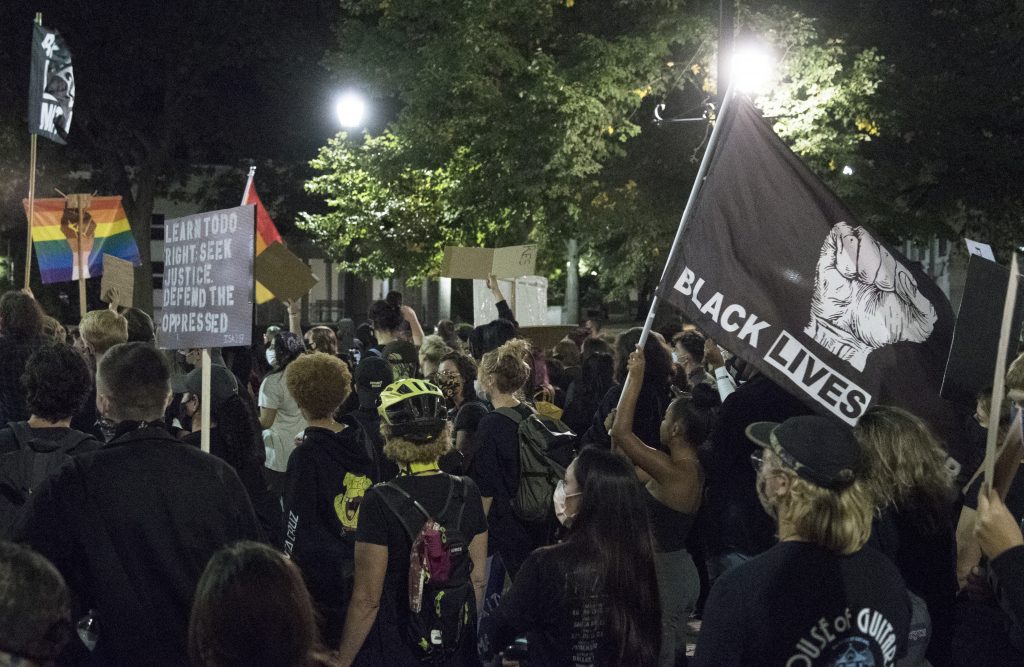In response to the deaths of unarmed Black men and women across the nation, Binghamton University’s Harriet Tubman Center for the Study of Freedom and Equity is establishing a Truth and Reconciliation Commission.
Anne Bailey, director of the Tubman Center, director of the Tubman center, director of graduate studies in history and professor of history, said the commission was launched “in response to the current season of racial reckoning.”
“A truth and reconciliation commission represents an innovative model to empower communities to deal with difficult aspects of their history while working toward reconciliation,” Bailey wrote in an email. “The idea is that in order to pave the way to a positive future, you need to address difficult issues in the past. The process of truth-telling can help a community press a reset button, if you will. It is a restorative justice model that fundamentally provides opportunities for listening and dialogue.”
One of the most famous examples is South Africa’s 1996 Truth and Reconciliation Commission that followed decades of apartheid, or institutionalized racial segregation. After seven years of hearing testimony from approximately 21,000 victims, the commission recommended a reparations program for the victims, reformation of South Africa’s social and political systems, prosecution of the perpetrators who were not granted amnesty and the archival of the commission’s work.
When thinking about the past, its connection to the present and how to build a better future, Bailey said she thought the best place to start would be in her home community — BU.
“Though our history does not go back to the country’s founding, we are not immune to the problems faced by society,” Bailey wrote. “We also thought that this is a strong community that can be even stronger by facing difficult issues regarding race in the past and making positive changes in the present and the future.”
Voluntary participation in the truth commission from all sectors of the campus community, including current students and alumni, will be welcome. Bailey said the commission also plans to invite notable speakers, such as Professor Mary Frances Berry, former head of the U.S. Commission on Civil Rights. The commission hopes to draw “actionable recommendations” from the testimony of volunteers and the speeches given by professionals.
BU President Harvey Stenger is working in partnership with the Tubman Center on this initiative.
“In order to create a better future, our nation first needs to come to terms with a troubling legacy of racial inequity and injustice,” Stenger said. “The recent events in Kenosha, Wisconsin, are just the latest evidence for this. We can’t just expect someone else to have those necessary, painful conversations and create lasting change. That work must first start at home, with each one of us.”
According to Sharon Bryant, associate director of the Tubman Center and director of diversity, equity and inclusion for Decker College of Nursing and Health Sciences, there is a tentative timeline currently in place for the commission. The plan is susceptible to change due to COVID-19.
“Our timeline includes spending the fall semester planning and working with the [Truth and Reconciliation Commission] advisory board and panel,” Bryant wrote in an email. “We plan to begin holding listening sessions in which individuals can give oral and written testimonies during the spring semester.”
This process has already begun at Decker College. A small session was held as part of a larger meeting where alumni were given the opportunity to share their negative experiences with Mario Ortiz, dean of Decker College and professor of nursing. Bryant said it was the first time many of the alumni had shared their experiences with administration.
“We have heard [alumni] say that they would not come back to [BU] because of some of the experiences that happened to them during their tenure,” Bryant wrote. “Now [alumni], students, faculty or staff can give testimony and release what has happened to them. As a panel, we will identify themes in the testimonies that we can address and make recommendations to President Stenger.”
Donald Nieman, executive vice president for academic affairs and provost, said he is hopeful that the Truth and Reconciliation Commission will help eventually end racial inequity at BU.
“As the summer concludes, we continue to be reminded in very painful ways that we have not overcome our nation’s long history of racism,” Nieman said. “This initiative will ensure that we at [BU] have the honesty and courage to identify racial inequities on our campus and take the steps necessary to end them.”



